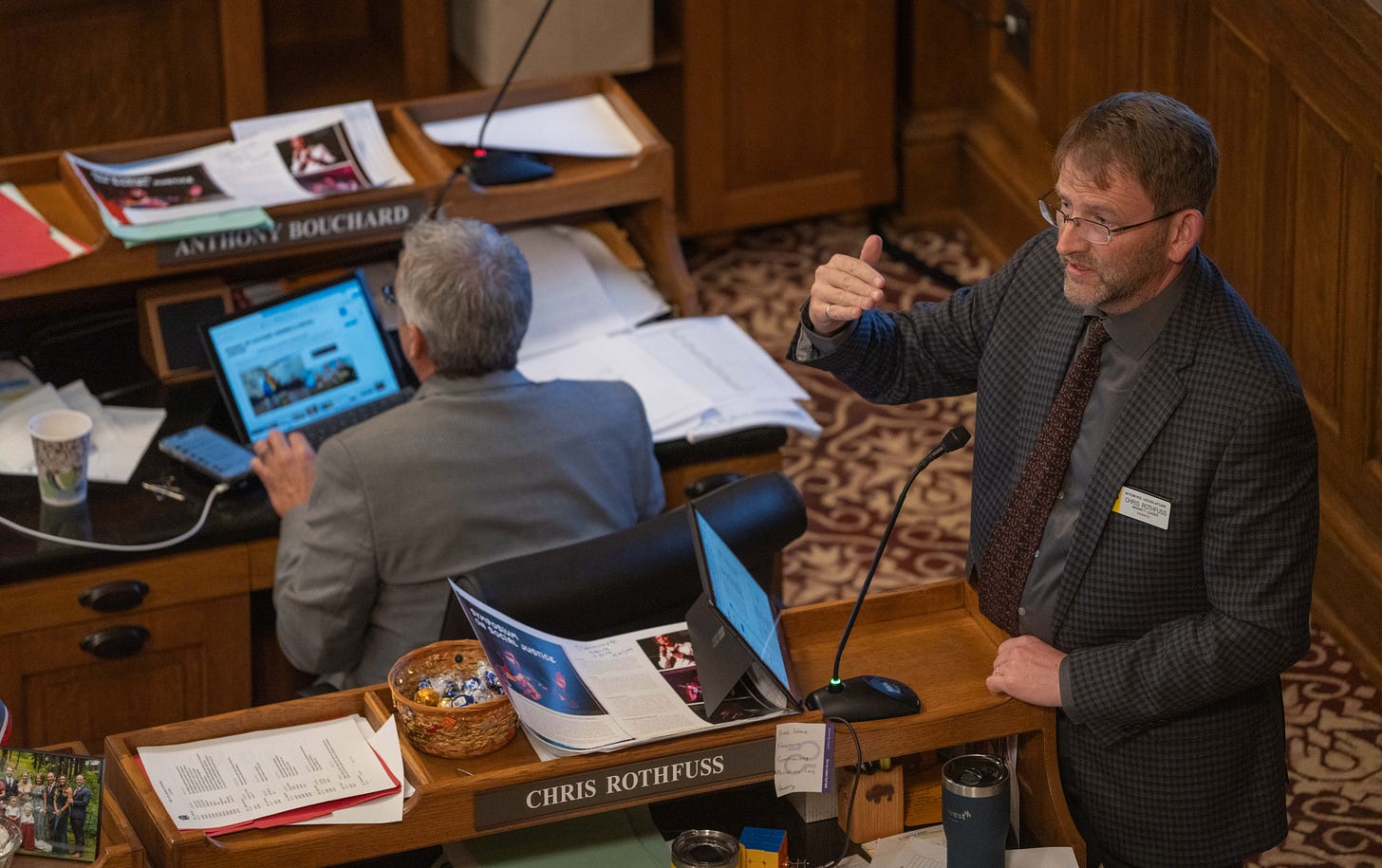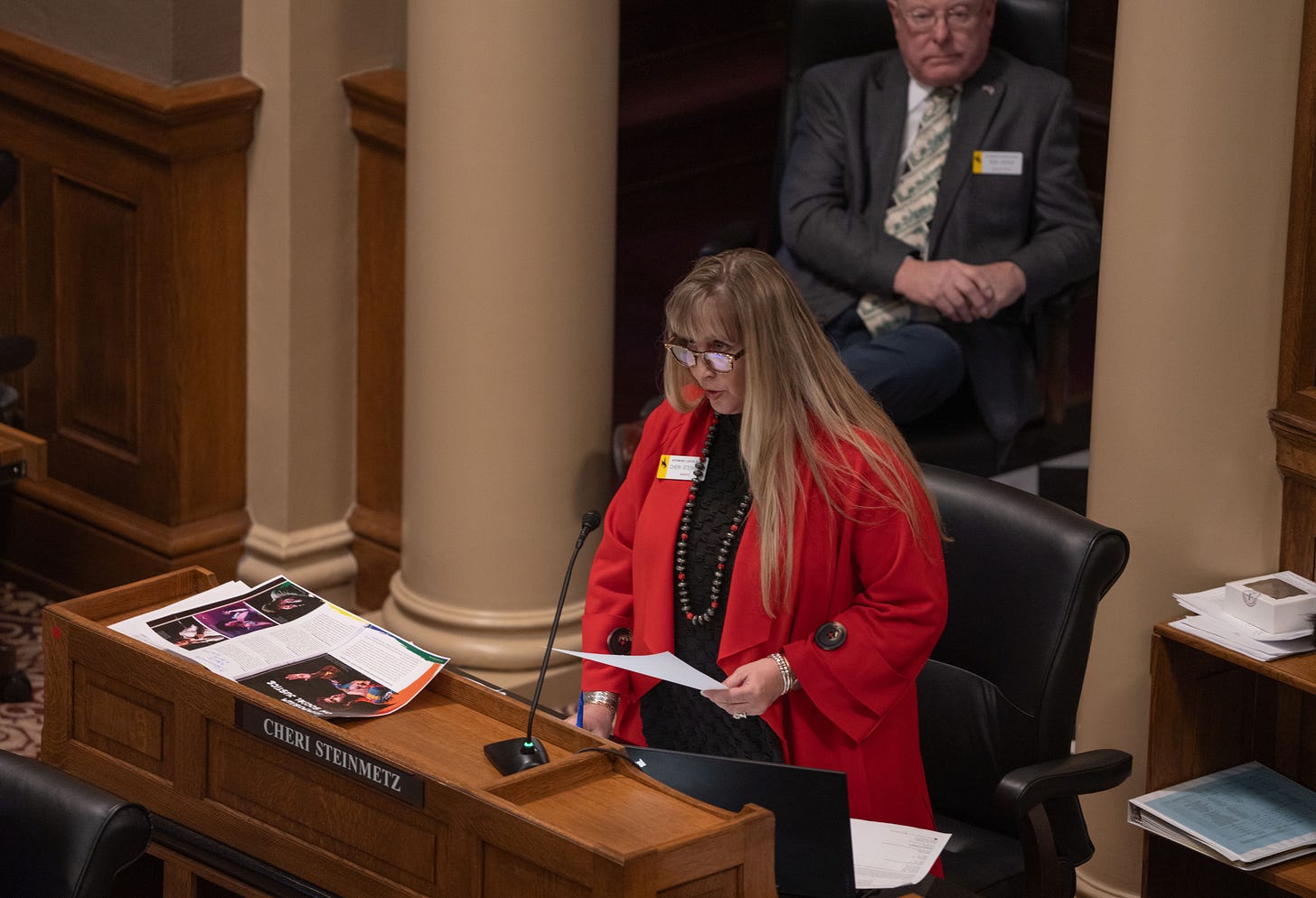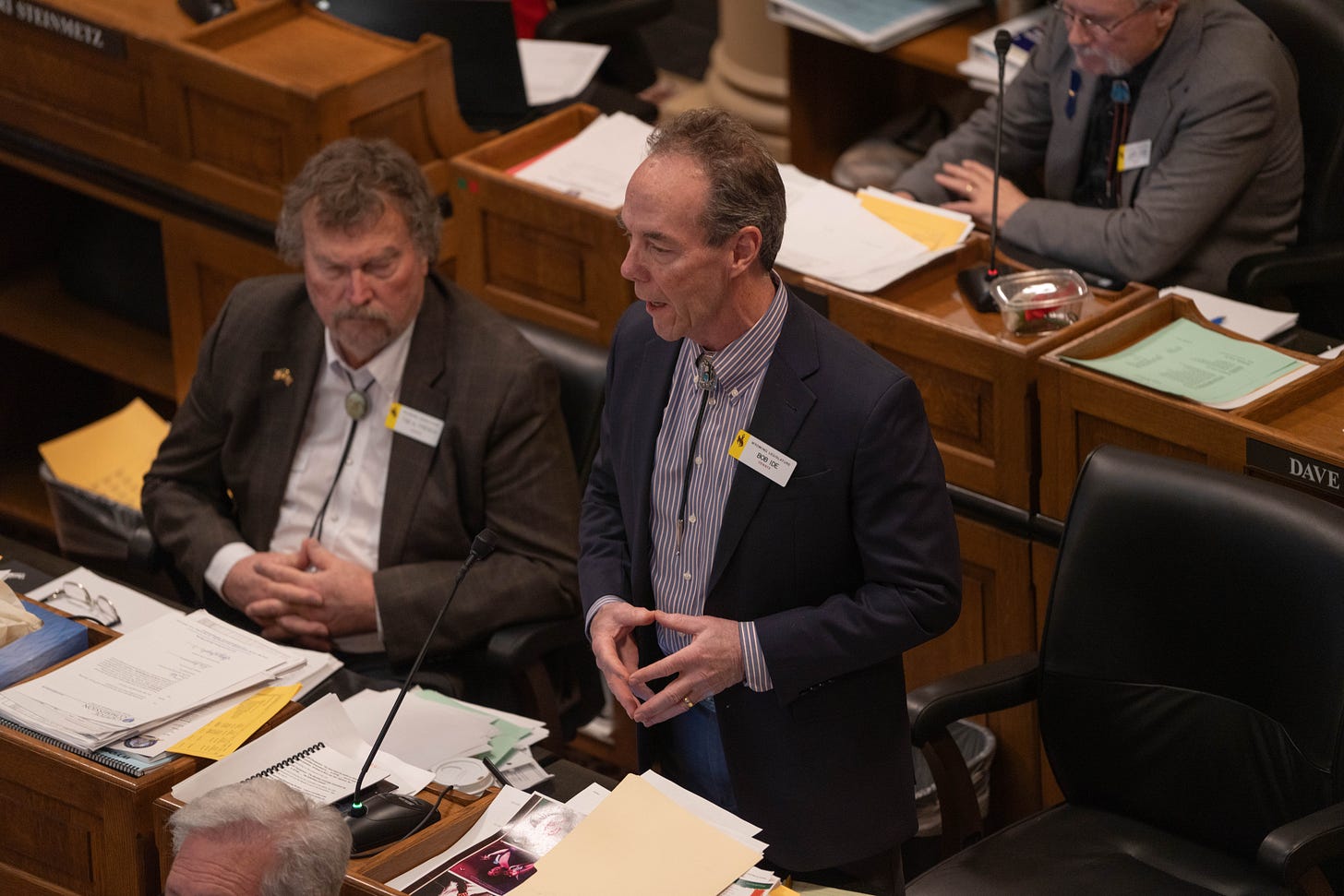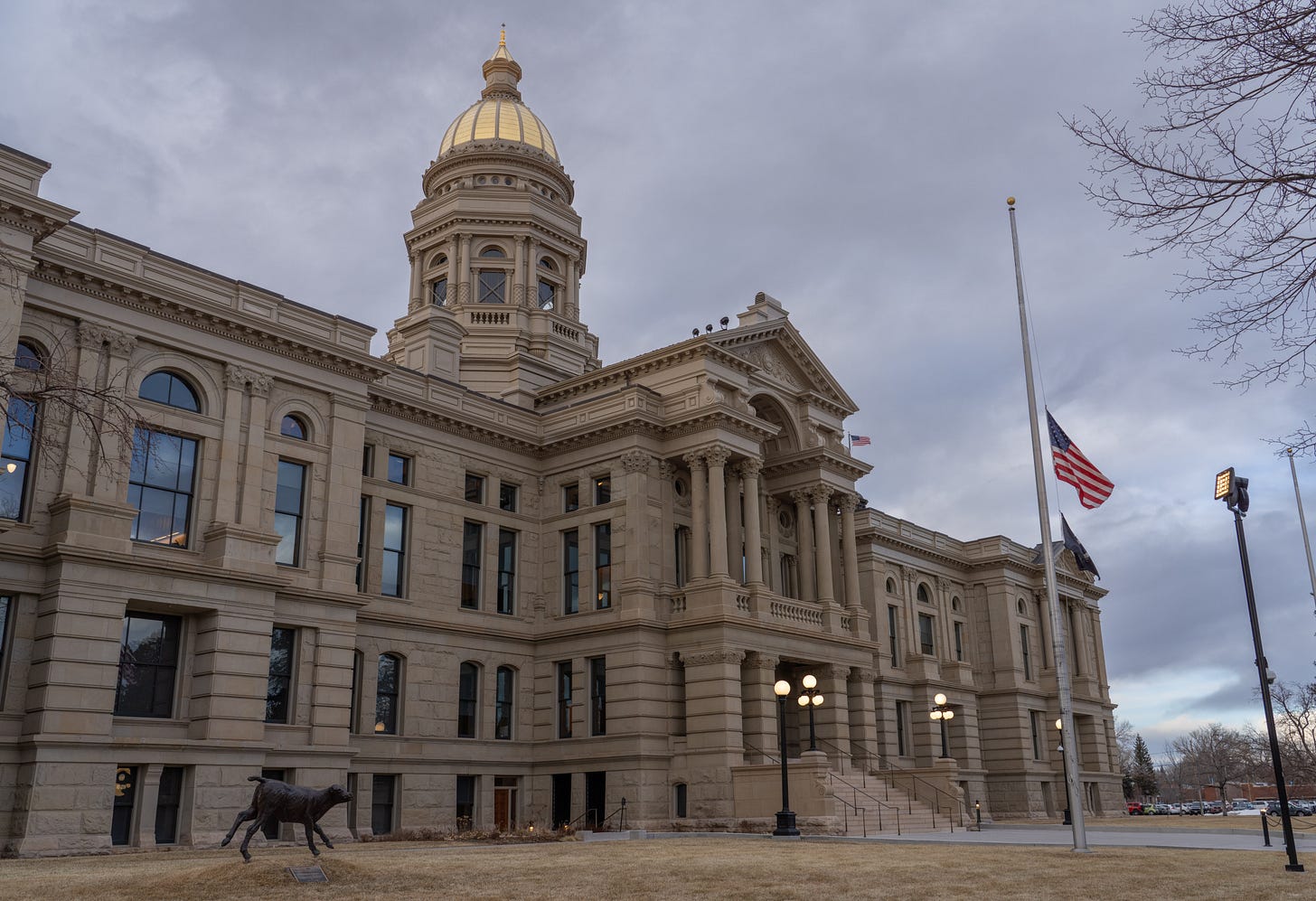Senate votes to defund UW gender studies
Albany County Senator Chris Rothfuss fought the amendment with an impassioned defense of academic freedom: “My kids are not afraid of ideas.”

The Wyoming Senate voted Wednesday to defund the University of Wyoming’s Gender and Women’s Studies Program, adding a footnote to the state budget bill on its third and final reading in that chamber.
The topic inspired significant debate. More than half of the chamber — 16 of the Senate’s 31 members — spoke on the amendment, arguing either for or against it. The debate pitted those advocating for academic freedom against those seeking to stop what they described as “woke” influences on the university.
Sen. Cheri Steinmetz (SD-3), the amendment’s sponsor, said she did not like the program’s focus or mission. On the Senate floor, Steinmetz specified that only “gender studies” courses would be affected, “so they would have to unwind that with the women’s studies.”
“I don’t believe it’s the right position for the university to take sides on this issue and put forth more of an ideology than a program,” she said before listing the program’s objectives, which include critically examining power structures and institutions through feminist and queer lenses, as well as from the perspective of indigenous, environmental, immigration, labor and economic justice movements.
“And so these are just things that my constituents have been concerned about,” Steinmetz added. “They’d like to see us redirect that into more of an unbiased classical education, as we have seen in the past with the university.”

While several senators voiced their support for Steinmetz’s amendment, others pushed back vehemently with speeches about the value of a liberal arts education and the inappropriateness of government officials deciding what should be taught at the university.
Steinmetz’s most forceful critic was Albany County Sen. Chris Rothfuss (SD-9).
“The idea that a majority of the legislature gets to cancel ideas at a university, ideas that are being sought out and embraced by the students — our students, our children at that university — seems unacceptable and certainly seems beyond the role of what a legislature should do,” he said.
The Senate adopted the amendment with an 18-13 vote, adding the footnote to its final version of the state budget bill. The Senate’s version and the House’s version will have to be reconciled in the coming week as the entire legislature hurtles toward a unified budget that can be passed to the governor.
It’s not clear whether Steinmetz’s amendment will survive that process given that a similar amendment already failed in the House.
Senators take a stand against diversity, equity and inclusion
Also on Wednesday, and immediately following the gender and women’s studies vote, the senators adopted another amendment defunding a university unit. That second amendment, also sponsored by Steinmetz, defunds the University of Wyoming’s Office of Diversity, Equity & Inclusion.
The amendment inspired colorful input from the senators seeking to kill the DEI office.
Sen. Charles Scott (SD-30) called the office a “monolith of wokeness” and said programs of this sort were the source of “rot” within so many liberal arts colleges. Sen. Anthony Bouchard (SD-6) blamed DEI programs for recent airplane failures. Sen. Troy McKeown (SD-24) suggested Wyoming should not embrace the modern ideas such an office represents.
“I had a hat once that said, ‘Welcome to Wyoming, set your clock back 10 years,’” he said. “I really liked it.”
These and other senators suggested that DEI programs, contrary to their stated goals, separate people and advantage certain groups over others. Rothfuss pushed back on this notion, saying DEI programs, and the ideas that underpin them, aren’t just about racial diversity; they also help rural and first-generation students navigate new environments.
“A lot of our students come to the University of Wyoming from small towns around the state,” he said. “There’s more people walking around Prexy’s Pasture at 9 a.m. than there are within 25 miles of some of those kids’ homes. It’s daunting. How do we make those students feel like they’re a part of the university? How do we ensure that they're comfortable at the university? That’s what this office works on.”
Sen. Lynn Hutchings (SD-5), the state’s only Black senator, said she never felt like she needed such a program to feel like she belonged.
“I’d like to say this program, the DEI, has brought more divisiveness in the Black community around the country than anything I’ve ever seen,” Hutchings said.
The amendment passed with a 20-11 vote.
Academic freedom vs. “traditional values”
Wednesday was not the first time Steinmetz brought an amendment to defund gender studies at the University of Wyoming.
Two years ago, during the last budget session, Steinmetz submitted the same amendment; it passed in the Senate with a close 16-15 vote, but was ultimately removed from the state budget by the Legislature’s Joint Conference Committee.
When Steinmetz pitched the amendment again Wednesday, she introduced it as “an old friend of the Senate.” This inspired Sen. Mike Gierau (SD-17) to quip: “This may be an old friend of the Senate, but it’s no friend of mine.”
The exchange was simply the first salvo in what would become a lengthy debate lasting 45 minutes.
Sen. Bo Biteman (SD-21) said his constituents didn’t want any of UW’s block grant funding courses they disapproved of.
“I have some cowboys back home that have some pretty colorful language when it comes to this that I won’t repeat on the Senate floor,” he said. “But this is one area where they’re saying, ‘Come on guys, what are you doing here?’ This is Wyoming. Are we going to change our mascot to the Social Justice Warriors? Because that’s where we’re going with this university. And they’re begging us to rein this in.”
Sen. Bob Ide (SD-29) added higher education should be strictly geared toward securing employment.
“You’re supposed to go down there to find a career path,” he said. “And, you know, a career path in gender studies, I don’t think that really prepares you for any job after college. That’s why I went there, was to get a job. So I think it’s not a good program that we have down there.”

Several senators pointed out that higher education is about much more than getting a job — though Rothfuss added he had a former legislative aide who minored in gender and women’s studies and now works as a lawyer.
Rothfuss said the real issues driving the amendment were not genuine concerns about finding employment, nor were they strictly budgeting concerns, as some had suggested.
“I know some people want to [defund gender studies] because some people really just don’t like the content,” Rothfuss said. “They really don’t like the ideas that are being presented and they don’t want other people to hear those ideas. But is that what we should be doing — shielding Wyoming citizens from information that they’re seeking out? Because some of us don’t like those ideas? That is not consistent with the spirit of higher education in the United States or Wyoming.”
But Ide suggested UW should bill itself as a conservative university.
“Kids around the state are, for the most part, raised with traditional family values and we’re losing them; they’re hearing all this conversation and their parents aren’t going to send them down there,” he said. “But I think we have a real opportunity to set University of Wyoming apart as a grassroots, traditional-value university and not go down the road of — what’s the saying? — ‘go woke, go broke.’”
Rothfuss said if students want to take gender studies courses — and class enrollment figures suggest they do — they should be allowed to pursue their interests and explore new ideas. He said interfering with that academic freedom is inappropriate.
“This is a state where we’re afraid of certain classes,” Rothfuss said. “My kids are not afraid of ideas. My kids could take these classes and know what to do with them and learn from them. These are beneficial courses.”
Others suggested the courses were not inherently valuable but defended the university’s ability to host them regardless.
Sen. Tara Nethercott (SD-4) said she wasn’t a fan of the course offerings, but that it would be “dangerous” to start telling UW what it can and cannot teach.
“This sets a very dangerous precedent that’s never worked in the history of the world,” Nethercott said. “When you don’t like an idea or a concept and you — the government, the all powerful centralized government — chooses to stop that speech, to stop the sharing of those ideas … that is against freedom.”
Sen. Affie Ellis (SD-8) reworked a version of the famous poem by Pastor Martin Niemöller that begins, “First they came for the Communists …” to express that once the government does away with gender studies, there would be little to stop it from targeting African American and Diaspora studies, Latino Studies, or Native American and Indigenous studies.
She too called the amendment “dangerous.”
In the end, these protests were outvoted.
Gender and Women’s Studies courses are not required … despite claims to the contrary
As the senators went back and forth on the amendment, they spent several minutes debating whether gender and women’s studies courses are required for graduation. A couple of senators proffered guesses before Rothfuss, who teaches at UW and represents its district, set them straight.
“No one — no one — at the university is required to take a gender and women’s studies course, unequivocally, without question,” he said. “The area of contention, potentially, is the [required] human culture credits — six credits total. And those six credits of human culture, there’s probably 100 courses that satisfy it.”
Students can take courses offered by the Gender and Women’s Studies Program to satisfy that requirement, Rothfuss said. But they are also free to choose from a variety of history, archeology, literature and even some language courses. Any six credits from this range of options can count toward the human culture requirement.
Six credits typically means two courses.
“There is no underlying conspiracy, there is no mandate to teach people things that they don’t want to learn,” Rothfuss said. “It is an opt-in menu, and you get to learn what you want to learn. But at the same time … we don’t stop you from learning things that other people don’t want you to learn. That’s a feature, not a bug.”
Despite Rothfuss’ definitive explanation, Steinmetz repeated her belief that students were “possibly made to go to the courses because it fulfilled some of their requirements under the general studies program.”
From his seat across the chamber, Rothfuss threw up his hands in frustration.




